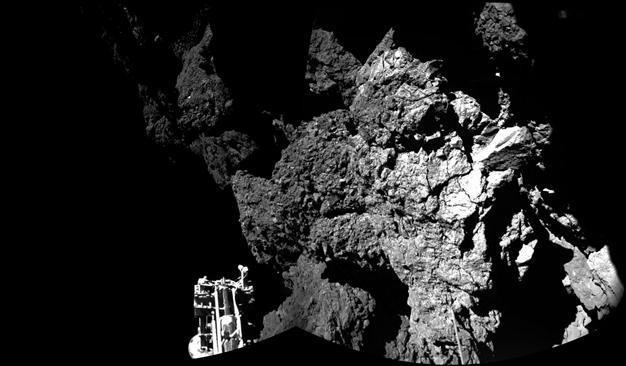Comet probe 'sniffed' organic molecules: early data
PARIS - Agence France-Presse

AP Photo
Mankind's first-ever probe of a comet found traces of organic molecules and a surface much harder than imagined, scientists said Tuesday of initial sample data from robot lab Philae.Philae fell asleep on comet 67P/Churyumov-Gerasimenko on Saturday, having run out of onboard battery power after 60 hours of prodding and probing an object zipping towards the Sun at 18 kilometres (11 miles per second).
The lander control centre in Cologne, operated by German Aerospace Center (DLR), said Philae had uncovered much about the comet in spite of a rough touchdown in a less-than-perfect spot.
"We are well on our day to achieving a greater understanding of comets," Ekkehard Kuhrt, project scientific director, said in a statement. "Their surface properties appear to be quite different than was previously thought."
Philae landed on "67P" last Wednesday after a nail-biting seven-hour, 20-km descent from Rosetta, its orbiting mothership which had travelled more than a decade and 6.5 billion kilometres (four billion miles) to meet up with the comet in August this year.
The touchdown 510 million kilometres (320 million miles) from Earth did not go entirely as planned, when Philae's duo of anchoring harpoons failed to deploy and it bounced twice before ending up in a crevice, its solar panels shadowed from battery-boosting sunlight.
Among the most anticipated data from Philae had been chemical analysis of a drill sample which scientists hoped would shed light on the origins of the Solar System 4.6 billion years ago, and maybe even life on Earth.
The DLR said the MUPUS probe, one of Philae's 10 onboard science instrument, hammered into the comet to discover it was "a tough nut to crack".
"Although the power of the hammer was gradually increased, we were not able to go deep into the surface," said research team leader Tilman Spohn.
Electric and acoustic experiments confirmed the comet was "not nearly as soft and fluffy as it was believed to be" underneath a surface layer of dust.
Despite its imperfect footing, Philae managed to deploy a drill, but it was not clear whether any soil sample had been examined onboard.
Yet the team said Philae's COSAC gas analyser managed to "'sniff' the atmosphere and detect the first organic molecules" shortly after landing.
Some astrophysicists theorise that comets "seeded" our fledgling planet with the beginnings of life-giving water and organic molecules, and hoped that analysis of "67P" would prove this.
















